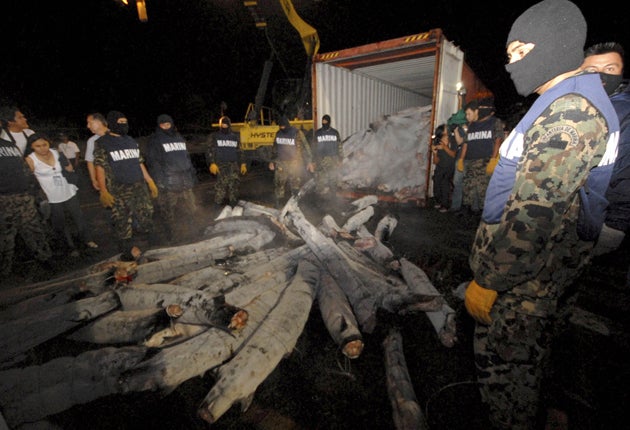Caught: the sharks used to smuggle a tonne of cocaine
Mexico takes a chunk out of the drug cartels after officials find more than a tonne of cocaine in shark carcasses

Your support helps us to tell the story
From reproductive rights to climate change to Big Tech, The Independent is on the ground when the story is developing. Whether it's investigating the financials of Elon Musk's pro-Trump PAC or producing our latest documentary, 'The A Word', which shines a light on the American women fighting for reproductive rights, we know how important it is to parse out the facts from the messaging.
At such a critical moment in US history, we need reporters on the ground. Your donation allows us to keep sending journalists to speak to both sides of the story.
The Independent is trusted by Americans across the entire political spectrum. And unlike many other quality news outlets, we choose not to lock Americans out of our reporting and analysis with paywalls. We believe quality journalism should be available to everyone, paid for by those who can afford it.
Your support makes all the difference.The Mexican authorities said yesterday they had uncovered more than a tonne of cocaine bound for the United States stuffed into the carcasses of 20 frozen sharks loaded on to a cargo ship in the Gulf port of Progreso.
Local and national media were invited to photograph the offending sharks at the busy port, which sits at the top of the Yucatan peninsula and is a short hop from the tourist resort of Cancun. The naval officers who made the discovery during a routine inspection using dogs and X-ray machines are seen keeping guard over the fishes.
It is a significant haul for the Mexican government that is struggling to contain a violent backlash against its own efforts to crack down on the drug trafficking industry. It comes after several other notable successes in the past few days including the seizure of an enormous methamphetamine laboratory high in the mountains in the state of Sinaloa on the Pacific side of the country and the arrest of a suspected drug lord in Cancun last week.
For the traffickers, who are at war not just with the government but also with each other over smuggling routes to the US, the raid in Progreso eliminates one new means of shipping the drug without detection. In the past, drugs have been found in religious statues, fruit cans and tiny submarines. This is new however, evoking images of unsuspecting Americans grilling cocaine-marinated shark steaks.
For the government, which has deployed 45,000 troops in the drugs war, the seizure is an opportunity to underscore to a sceptical public that progress is being made. While the President, Felipe Calderon, appears determined to keep up the pressure on the cartels, he is coping with a rising tide of violence that has been concentrated mostly near the northern border with the US, but that has also flared in places like Cancun, Acapulco and Mexico City. So far this year, 2,700 people have been killed in drug-related violence in Mexico, equalling last year's pace when 6,300 people died.
"We are talking about more than a tonne of cocaine that was inside the ship," said a navy commander, Eduardo Villa. "Those in charge of the shipment said it was a conserving agent but after checks we confirmed it was cocaine."
On the other side of the country in Sinaloa, the discovery of the clandestine methamphetamine factory was almost as significant. Soldiers found a giant water tank they at first thought was for irrigating marijuana fields. Subsequently, however, they found ephedrine in a nearby shed, the main ingredient for meth, which is an increasingly popular drug right across the US. Officials said the factory was equipped to produce 40 tonnes of the drug – 300 million doses - with a street value of $1.4bn (£850m).
Meanwhile, the authorities in Cancun said they have detained Juan Manuel Jurado Zarzoza, a suspected cartel leader also known as the Puma, who has been sought in connection with the murder in February of the retired Brigadier General Mauro Enrique Tello Quinones. The Brigadier was recruited by the Mayor of Cancun to help cope with growing drug-related violence. He was tortured and murdered within days of his arrival.
Last weekend, meanwhile, troops raided a ranch near the border city of Ciudad Juarez where they arrested 25 men who were disguised in soldiers' uniforms. Drug runners masquerading as soldiers and police officers is another new problem facing the government. A huge prison break-out last month involved a gang who arrived before dawn at the prison in a fleet of fake police cars and wearing police outfits.
Join our commenting forum
Join thought-provoking conversations, follow other Independent readers and see their replies
Comments